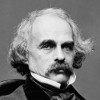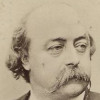“ A man, at least, is free; he may travel over passions and over countries, overcome obstacles, taste of the most far-away pleasures. But a woman is always hampered. ”
Gustave Flaubert, Madame Bovary (1856). copy citation
| Author | Gustave Flaubert |
|---|---|
| Source | Madame Bovary |
| Topic | passion travel |
| Date | 1856 |
| Language | English |
| Reference | |
| Note | Translated by Eleanor Marx-Aveling |
| Weblink | http://www.gutenberg.org/files/2413/2413-h/2413-h.htm |
Context
“As Charles, however, spoke of the boy at every meal, she soon began to think of him more consecutively.
She hoped for a son; he would be strong and dark; she would call him George; and this idea of having a male child was like an expected revenge for all her impotence in the past. A man, at least, is free; he may travel over passions and over countries, overcome obstacles, taste of the most far-away pleasures. But a woman is always hampered. At once inert and flexible, she has against her the weakness of the flesh and legal dependence. Her will, like the veil of her bonnet, held by a string, flutters in every wind; there is always some desire that draws her, some conventionality that restrains.”
source



